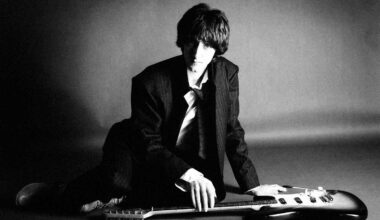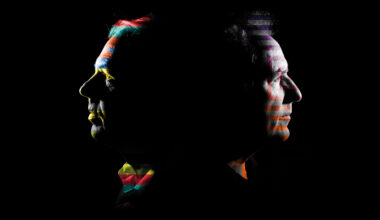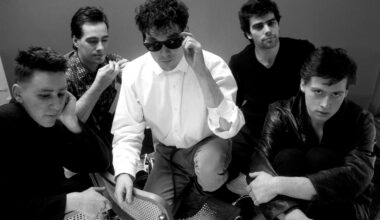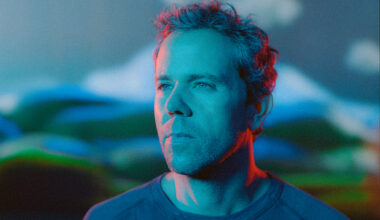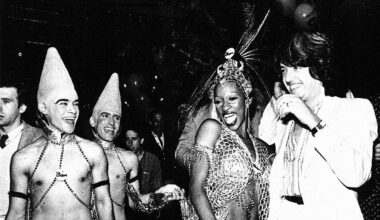Marking 25 years at the coalface, ‘The Day Is My Enemy’ is The Prodigy’s first album since 2009’s ‘Invaders Must Die’ and finds them at their raging best. In this exclusive piece for Electronic Sound, the band’s official biographer takes us inside the camp with a personal account of his unfolding friendship with Liam Howlett and talks to the producer about the fury that remains at the heart of his sound
I first met Liam Howlett at a Perception rave during the first days of The Prodigy. I wasn’t a journalist, he wasn’t a pop star. We were just ravers-in-kind and we bonded in a way that everyone did back then. With a grin, a nod, a few words of infinite wisdom, a shared bottle of water, a shared experience.
Years later, we struck up a friendship thanks to a mutual love of ‘Tomb Raider’ on the PS1. The unlikely vehicle for this discovery was a Playstation league that I organised for Muzik magazine. The league, which pitted the great and the good of the dance music world against each other on pre-release Playstation titles, had a number of surprising impacts on the underground fraternity of 1997.
Drum & bass lynchpins Reinforced and Metalheadz went to war over topping the league, with Goldie regularly phoning my home demanding early copies of the games before his rivals got theirs. “I know where you live and I’m fucking coming round,” he yelled down the line one night, having left me over 50 answerphone messages that day.
Liam Howlett seemed to be taking it as a bit of fun, until he suddenly asked me to stop sending him games and let his Prodigy bandmate Leeroy Thornhill take the job on instead. “The record label are on my back about the album and I can’t get on with it ‘cos I’m spending all my time on ‘Tomb Raider’,” Liam told me.
The album that the Muzik Playstation League was inadvertently holding up? ‘The Fat Of The Land’.
‘Firestarter’, released in March 1996, had primed an excited public for the follow-up to 1994’s epoch defining ‘Music For The Jilted Generation’. It was only when someone from the band’s then-label XL also mentioned they would rather I didn’t send Liam any more gaming distractions that I realised how worried they’d become. XL’s future would be built around the success of ‘The Fat Of The Land’. No Prodigy? No Adele. The label’s unofficial ban didn’t stop Liam arriving at Leeroy’s Braintree home in a state of youthful excitement when I brought round a development version of ‘Tomb Raider 2’ for them to demo, though. But that’s another story.
My friendship with Liam has developed over the years and the Prodigy family have become part of my everyday life. When I was with them on a particularly memorable trip to Paris on the ‘Fat Of The Land’ tour, they made sure I made it back to the UK when my wife went into labour. That meant getting me from the ganja-choked backstage area, where photographer Pat Pope had set up an impromptu studio to create a series of intense, iconic portraits of the band, to my home in south London with alarming efficiency.
That family connection has remained ever since. A couple of years back, Liam sponsored my son’s football team, which the tabloids loved. Cue ‘Smack My Pitch Up’ headlines. When the band toured Brazil soon afterwards, every interview started with questions about football, a sport that Liam actually has very little interest in.
My relationship with The Prodigy hasn’t all been oneway, mind. I once advised Liam to buy ‘Two Pages’ by 4 Hero, a record he hated (“I left it in me hotel room. Fucking shit, man”). I also put the wheels in motion for his DJ session on Mary-Ann Hobbs’ Radio 1 show that eventually became the ‘The Dirtchamber Sessions Volume One’ set. Does any of this impact on my ability to remain impartial? Maybe. Has it affected my honesty? Not at all. In fact, I’ve always been totally honest whenever Liam’s invited me in to listen to a new track or a new album.
When I first heard ‘Shoot Down’, his collaboration with Liam Gallagher, I said I thought it sounded out of place and old fashioned. When he called from the studio one night to play me a version of ‘Memphis Bells’ (which at the time had this deep south hip hop vibe, like a leftfield Timbaland), I raved about it. Probably wisely, he ignored me and released the Gallagher mash-up and a different version of ‘Memphis Bells’. But I think he appreciated hearing my opinions.
The only time I haven’t been completely truthful about a Prodigy track was when Liam first played me ‘This Baby’s Got A Temper’. What I wanted to say was that he’d lost all the tension in his production, that he sounded like he was trying too hard to be The Prodigy that everyone expected, that a really strong song had become kind of mediocre, a parody of The Prodigy rather than a brave new statement. Instead, I said it was “fucking awesome, dude”. It later transpired that he knew it wasn’t the track he’d intended it be. Maybe that was the time above all others for honesty.
Liam Howlett is someone who is never afraid to speak his mind. I like that. He has a loyalty to his friends that runs deep. I find that admirable too. Every move he’s made has been with great integrity and his music is created without any sense of cynical calculation. Everything he produces (with the exception of ‘This Baby’s Got A Temper’) is the result of an emotional toil that is always underpinned by the exacting statement “If I’m not feeling it, it won’t get released”.
Why else would The Prodigy have taken seven years to follow up ‘The Fat Of The Land’, dumping nearly an album’s worth of recordings along the way? Many groups would have knocked out a pale imitation and had done with it. Not a group led by Liam Howlett. And if you want proof that his integrity remains fully intact, check out The Prodigy’s latest album, ‘The Day Is My Enemy’.

It’s why I find myself sitting in his studio in London’s King’s Cross on a cold, drizzly afternoon, listening to the album and being tempted out of retirement as a music critic. Not many artists could get me to do this. But not many artists are like Liam Howlett.
“Pull up something to sit on,” he says, speaking from the captain’s chair where he steers his creative ship. I have the choice of a drum stool or something that looks like Sweeney Todd might have passed through the building at some point. I choose the drum stool.
Starting with the release of ‘The Dirtchamber Sessions Volume One’ mix album in 1999, the ritual of listening to each new Prodigy release with Liam has become one of the most enjoyable and interesting regular occurrences of my life. Back in 1999, my personal playback took place in his Essex countryside home, a converted barn next door to a farmhouse where Keith Flint lived. Since then I’ve been introduced to each new album in a different location, each somehow fitting the moment.
I first heard 2002’s ‘This Baby’s Got A Temper’ single during the final mixing stages at Rollover Studios in west London. The record emerged at a time when both Prodigy fans and the band’s label were looking for something new in the wake of the global success of ‘The Fat Of The Land’.
‘Baby’s Got A Temper’ was only the second new track that Liam completed in the five-year period between 1997 and 2002. The other was a (still unreleased) collaboration with 3D from Massive Attack called ‘No Souvenirs’. Drawing heavily on psychedelia and described by Liam as “like The Beach Boys on acid”, ‘Baby’s Got A Temper’ featured that leering, punch-drunk rebellion of a chorus declaring, “He love Rohypnol / She got Rohypnol / We take Rohypnol / Just forget it all”.
It was a lyric that was bound to bait the red tops, another folk devil soundtrack to add to the list that already included promoting arson (‘Firestarter’), violence against women (‘Smack My Bitch Up’) and even Nazi ideology (the sleeve notes to ‘The Fat Of The Land’ appropriated one of Hermann Goering’s speeches). And then there was the fact that Liam’s track with 3D had been recorded for the score to a porn movie featuring zero gravity ejaculation as its USP. Mention of the date rape drug seemed par for the course.
As I listened to ‘Baby’s Got A Temper’ with Liam, he seemed obsessed by the finer nuances of the mix. He wandered nervously from speaker to speaker, occasionally pressing buttons on the mixing desk and asking the engineer to fine tune the programming. His bleached mohican hairstyle was bedraggled, his camouflage cords and white Ping Pong Bitches T-shirt crumpled, his eyes bleary. Recording the single had, it seemed, taken over his life.
“To be honest, it never occurred to me that people would be bothered about Keith’s words,” he told me later, when I broached the inevitable criticism. “I loved the lyric when Keith showed it to me and I just said, ‘I’m gonna do something with this’.”
The track had started out as a demo for Flint, Keith Flint’s punk group. Then called ‘NNNN (No Name No Number)’, it was a blend of poppy punk and hardcore, with Flinty sneering like a reality checked John Lydon. Liam might well have wished he’d left it as a Flint track as it received short shrift and sent The Prodigy to the controversy-courting has-beens corner.
It also led to disquiet in the band, with Leeroy Thornhill leaving to put out his own music as Flightcrank, Maxim turning his focus on a solo career, and Keith signing Flint to Interscope Records. Following their headline appearance at the Reading Festival in 2002, where there were rumours of a backstage bust-up, The Prodigy seemed to be a thing of the past.
“That record was a mess,” Liam admitted later. “In fact, it was as accurate a sonic description of us as a band at that time as you could have got. We were hardly communicating. I suppose we didn’t like each other very much really.”
Liam ditched the tracks from the album he’d been working on and threw away the keys to his home studio. He decamped to his bedroom with a bottle of wine, a James Bond movie and a laptop, and started crafting an entirely new project. The result was 2004’s ‘Always Outnumbered Never Outgunned’ album, which I was invited to hear at Liam’s then-manager’s home in Essex. Neither Keith nor Maxim appeared on the record. In their place was an array of guests who were linked through a taste for the wayward.
“I had to get back to what I was about,” said Liam. “This is me writing tunes I can rock to and not thinking about other people.”
As a whole, ‘Outnumbered’ is The Prodigy’s most expansive album. True, there is nothing as zeitgeisty as ‘Firestarter’ and nothing as influential as ‘Poison’, but Liam knew exactly what he was trying to create. It may not have be the headline-grabber that ‘The Fat Of The Land’ was, but as I listened to the playback it was clear that it was the work of a man in love with the idea of making music again.
The problem was, it would seem, fans of The Prodigy’s rocking beats and guitar mash-ups weren’t ready for electro-funk, or samples of ‘Thriller’, or female vocals from the likes of actress-singer Juliette Lewis and electroclash outfit Ping Pong Bitches. ‘The Fat Of The Land Part Two’ it wasn’t. But it did sow the seeds for the albums that followed.
‘Their Law’, The Prodigy’s 2003 greatest hits package, was a timely prompt of the band’s amazing output and it also reintroduced the world to the greatest live show on earth. The arena tour that followed brought Liam, Keith and Maxim back together, reminding them just how much they vibed off each other and how much they loved to rock live. They played voodoo with their rave classics, reworking and rewiring their smouldering best, and once again showed just what a potent force they are.
The fusion of that positivity with Liam’s writing process became clear to me in 2008, when I arrived at Trevor Horn’s Sarm West Studio in Notting Hill to hear the band’s next album, ‘Invaders Must Die’.
“We were all a bit paranoid and had to discover whether we could be a unit again,” Liam told me at the time. “We felt other people had started to infiltrate our band and they were having a negative effect. We were talking and either Keith or Maxim said, ‘Those fucking invaders must die’, and I was like, ‘That’s the album title right there!’. It’s quite a personal title for us, it’s about protecting what’s yours, about keeping things tight.”
Interestingly, the media weren’t hugely interested by the return of the band – until ‘Invaders Must Die’ stormed to Number One on the week of release. To date, the album has sold over 1.4 million copies globally.
“I love that we surprised people,” said Liam. “A lot of the music press had written us off, they didn’t expect us to come back, and now they’re eating their words. This is when we’re at our best, when people don’t see us coming, when we’re the underdogs.”
Which brings us back to this grey afternoon in King’s Cross where I am about to hear ‘The Day Is My Enemy’, the follow-up to ‘Invaders Must Die’, for the first time. Liam Howlett’s appearance has changed little in the intervening years. He still sports that haphazardly home-cut bleached mullet hairdo. The pallor of his skin still betrays too many nights in the studio. He still talks with great passion and intensity about his music and litters his conversation with laughter.
Despite looking like an office from the outside, Liam’s studio offers a visual representation of both his personality and his music. Scattered among the analogue equipment are humorous, ironic artifacts that range from the kitsch to the downright stupid. But even this isn’t as intensely packed with personality as his previous studio in a tiny loft area at Sarm West. Every inch of that space gave away clues to its inhabitant. Entering the dark production lair felt like walking into Liam’s brain, filled to the point of claustrophobia with kit, ideas, humour, stuff.
“That was a really good place for me and I just wanted to get straight onto this record in the same way as I did the last one,” he confides. “But the building was fucked and water was getting in. I had these really heavy velvet curtains covering the walls all around the room and they started to go mouldy. After a while, I’d put down loads of riffs, but I didn’t have any finished tracks. I just thought, ‘Fucking hell, the elements are against me here’. In the end, Trevor [Horn] wanted to sell up, but to be fair to him he held off ‘cos I was working on the early stages of this album. He was always really good to us.”

It was at Sarm West that the initial sketches of ‘The Day Is Our Enemy’ were conceived. It felt like a personal decompression chamber, a place where Liam could cut off the outside world and get inside himself to dredge out his deepest motivations. If the anger and the abrasion and the cluster bombs of ideas sometimes have a suffocating energy, then that tiny space had a lot to do with it. But the influence of Sarm West can also be seen beyond the actual music.
“I do most of my work at night, it’s when I’m at my best,” he explains, showing off the painting that will become the cover of ‘The Day Is Our Enemy’. “So I started to see this fox when I was leaving the studio in the dead of night. This one time, it just looked at me, just stared at me like I was in his space. I loved the idea of this fox coming into the studio and taking what it wanted before leaving when it wanted. I watched this fox and I thought, ‘That’s us, that’s The Prodigy’.”
Liam cues up the opening title track of the album, pausing briefly to place what I am about to hear in context.
“I had a great time making this record,” he says. “I was in the fucking zone. Probably the best buzz I’ve had from making any album. A lot of the new tracks we’ve been playing live aren’t on it, tracks like ‘Jet Fighter’ and ‘AWOL’. I like them, but they didn’t quite feel right to me. As soon as I got into the zone, I knew what I wanted it to be and from then on in it was, ‘OK, this is it, we’re off now’.”
At the click of a mouse, the sound of Switzerland’s famous Top Secret Drum Corps comes thundering through the speakers. Liam gives a satisfied smile.
“I wanted a military vibe and was looking at these militaristic drummers with that Royal Tournament and Edinburgh Tattoo type vibe,” he shouts over the intro. “Then I came across these guys and I was like, ‘Fucking hell, these dudes are just like another level’. They were almost playing Prodigy beats and I thought, ‘I’ve got to get them on the album’.”
What follows is 14 tracks that travel the full range of The Prodigy at their finest – a supercharged melange of pounding breakbeats, 60s garage rock, weird retro sci-fi and analogue driven mayhem. Throughout, the vocals draw on the melodies of old school rave, dub reggae and punk. In many ways, ‘The Day is My Enemy’ is the angry twin to the ‘Invaders Must Die’ party. It sounds very much a part of the Prodigy canon, a logical next step in their story.
Indeed, the album reveals a clear sonic development. The tracks are more inherently experimental and that rock edge has become enveloped into the electronic warfare. Interestingly, listening to the band’s back catalogue, the only album that seems out of place now is ‘The Fat Of The Land’. It’s almost too laboured, as if Liam knew what he was after but couldn’t quite get there.
‘The Day is My Enemy’ is that album, the one he was aiming for back in 1997, a record on which all those opposing sounds and ideas, the contradictions between the studio producer and the live band, the conflicts between rock and rave, finally, fully, come together. A sum of the whole that is significantly more than its parts. And it’s a bloody angry whole at that.
“It’s not me personally that’s angry, it’s just that’s how I like our music to be,” he laughs. “I see music as a form of attack, but it has to attack in the right way. It has to drop into some kind of dopeness for it to be The Prodigy. I hate manufactured anger. I didn’t try and make it like that, it’s just what it is.
“It’s like with ‘Invaders’, that had a kind of a party vibe. It was more old school sounding because I guess it was a sonic representation of where we were at that time. I guess us getting back together had a positive vibe. The majority of the tunes on this album, even the old school ones, have an urgency about them. They really sum up the band perfectly for me.”
From the fox on the record cover and its connotations of outsiderness to the way that the production flies in the face of the contemporary dance music climate of EDM, ‘The Day Is My Enemy’ is a totally cohesive statement that comes with an ideology of opposition. The clearest and heaviest assault is ‘Ibiza’, a track that finds Liam collaborating with Sleaford Mods and pointing the finger at the single-minded hedonism of the EDM generation.
“People have got lazy,” explains Liam. “It’s all presets on a synth plugin. This album is us saying, ‘We know what’s going on and we’ve got something to say’. But it’s not like us saying that we’re better than anyone, it’s done with a fucking punch and a wink. Why should we keep quiet? We have to speak our minds.
“Thing is, we cannot be put in the same category as those fucking EMD twats. I need to have a very clear separation so no one can be confused. We’ve got our own form of electronic music, we always have done. We’re nothing to do with the EDM thing because that’s just about going out and partying without anything else. There’s much more to The Prodigy. I think you can dive into any of the tracks on this album and go, ‘Yeah, that’s The Prodigy’, but these EDM divs are all the same. How long can it keep going? Same old bollocks over and over again. You can’t tell some of ‘em apart.”
Liam’s frustration at the EDM scene runs deep. To him, it is the product of a lack of ambition in musical terms. He believes a lot of EDM producers don’t have the ability to step beyond the confines of the genre and the limitations of a world of presets and plug-ins.
“People don’t push it enough,” he continues. “It annoys me when you know what a new electronic record is going to sound like before you’ve heard it. It has to be authentic in the analogue input. I won’t use those tricks that are on the computer, I’m not interested. Turn the quantise off and let it flow.
“Most of the riffs on ‘The Day Is My Enemy’ are played live and we didn’t zoom in on them to make them tight. The first album was the same, but that’s because I didn’t know how to turn the quantise on. Then I realised that was a strength, so I’ve always wanted to keep that looseness. I’ve worked hard to create a sound that’s us and to go against the preconceptions about what we should do.”
As the final track of ‘The Day Is My Enemy’, ‘Wall Of Death’, comes to a close, I’m overwhelmed with the sense of having just gone 14 rounds with a rottweiler, teeth bared and baying for blood. Even the filmic moments snarl. It’s a rabid anger that screams, “We are The Prodigy”.
“We’ve been around for a fucking long time and we’re still making music that excites us,” says Liam. “It’s done for the right reasons and it’s fucking serious. No one else is doing this like us.”
No one indeed.
The First Liam Howlett Interview
The first interview with Liam Howlett in the music press was published in Melody Maker in August 1991, around the time of the release of ‘Charly’. The short piece was written by Electronic Sound editor PUSH
“A lot of my friends have told me that they think the new single will get into the Top 40 but I hope they’re wrong,” says Liam Howlett, the brains behind The Prodigy. “It’s not that I don’t ever want to be successful, it’s just that I’d rather continue to be an underground act for another two or three records and work on expanding a hardcore following. The reason so many dance groups are sitting in the charts one week and then completely forgotten the next is because they have no real foundation. The last think I want is for The Prodigy to be a one hit wonder.”
Whether he likes it or not, Liam’s friends may well be right. The single in question is ‘Charly’, one of the most ingenious and infectious rave tunes you’ll try to break your neck to this summer. The hard and fast breakbeats are a clue to Liam’s former role as a DJ with London rappers Cut 2 Kill, the orchestrated keyboards reflect his admiration for the new wave of Belgian beat masters, and the samples are instantly recognisable. First there’s the sound of a cat angrily miaowing and then comes the sad little boy’s voice: “Charly says always tell your mother before you go off somewhere”.
“Yeah, I’m sure everybody will remember that television advert from when they were kids,” says Liam. “It used to be on every Saturday morning without fail. The samples have certainly helped the track take off, but because I don’t want it to be seen as a novelty record I’ve made sure that the tracks on the flip are radically different. ‘Pandemonium’ is a fairly straightforward hardcore tune while a piano and snatches of vocals give ‘Your Love’ a more uplifting, melodic feel.”
Signed to XL Recordings at the end of last year, ‘Charly’ is the long-awaited follow-up to The Prodigy’s acclaimed ‘What Evil Lurks’ EP. In the six months or so since the latter was released, Liam has performed at countless raves up and down the country. He insists on as much of the show as possible being live and is usually joined onstage by an MC, a couple of percussionists and two madcap dancers.
“We work our live show along the same lines as N-Joi and Shades Of Rhythm, both of whom I have great respect for. It’s a shame that more dance acts don’t think about that side of things instead of just aimlessly wandering about the stage. Even when I’m not actually playing, I go to a lot of raves and I’m forever hearing people moan when a PA is announced. On the other hand, because I am a raver, I know what they want to see and hear, and I’ll often come home from a night out and feel inspired to switch on the keyboards and the computer and start to work. The Prodigy is basically all about getting the buzz of a rave onto vinyl.”
‘The Day Is My Enemy’ is out on The Prodigy’s Take Me To The Hospital label

